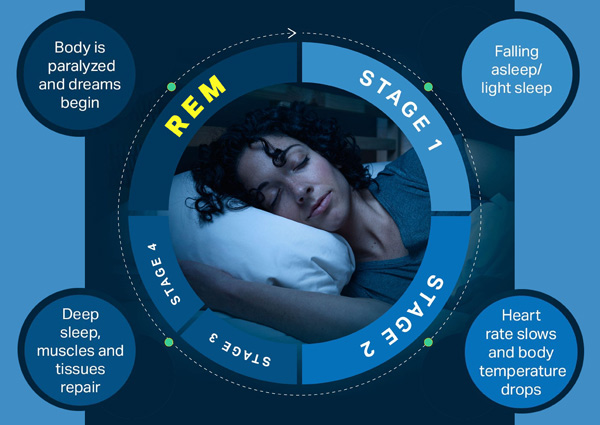Sleep disorders are on the rise. Research published in the Journal of Clinical Sleep Medicine found that an estimated 13.6 million U.S. adults suffer from at least one sleep disorder. This doesn’t include the tens of millions that suffer from an occasional sleep issue.
Fortunately, one easy step to take in battling the epidemic is to cut out junk food. For example, a number of epidemiological studies have shown that diets with greater sugar content are linked to poor sleep quality.
Now a new study from Uppsala University, Sweden has found that foregoing junk food for healthier options will ensure a better REM sleep cycle—the restorative, deep part of sleep.
Study details
Though the study was small—with just 15 participants—it was a randomized cross-over trial, meeting the international standard for scientific trials.
To conduct the study, researchers recruited young, normal-weight participants who were willing to be carefully monitored for repeated sleep sessions while consuming specific diets, both healthy and unhealthy.
Participants were first screened for their sleep habits, which had to be normal and within the recommended range (an average of seven to nine hours of sleep per night).
In random order, the participants were given both a healthier diet and an unhealthier diet.
The two diets contained the same number of calories, adjusted to each individual’s daily requirements. For the purpose of this study, “unhealthy meals” were considered those with higher sugar and more processed food items.
The meals of each diet had to be consumed at individually adjusted times, which were matched across the two dietary conditions. Each diet was consumed for a week, while the participants’ sleep, activity level and meal schedules were monitored at an individual level.
After each dietary intervention (healthy versus unhealthy), a washout period of several weeks took place. As described in the online Supporting Information Methods, an experimenter instructed the participants to carefully match sleep-wake cycles and activity levels across the two diet arms.
This also entailed aiming to maintain identical daily food intake timing across the two diet study arms in relation to the daily sleep–wake schedule.
After each diet period, the participants were examined in a sleep laboratory. At the laboratory they were first allowed to sleep a normal night, while their brain activity was measured to monitor their sleep. The participants were then kept awake in the sleep laboratory, before being allowed to catch up on sleep. Their sleep was monitored and recorded in this case, too.
Conclusions
At the end of the two trial periods the conclusions clearly showed that when study participants consumed the unhealthier diet, the quality of their deep sleep was of poor quality compared to when consuming the healthier meals.
RELATED: Sugar & Sleep
Researchers studying university students in Saudi Arabia concluded that high sugar intake was detrimental to quality sleep, noting:
“This study confirms the negative effects of high added sugar on sleep quality and duration and recommends reducing its intake to less than 10% of the total energy for better health and life quality.”
The study was published online in the American Journal of Lifestyle Medicine in August 2019.
“Specifically, we looked at slow-wave activity, a measure that can reflect how restorative deep sleep is. Intriguingly, we saw that deep sleep exhibited less slow-wave activity when the participants had eaten junk food, compared with consumption of healthier food. This effect also lasted into a second night, once we had switched the participants to an identical diet,” explained Jonathan Cedernaes, Physician and Associate Professor in Medical Cell Biology at Uppsala University.
“Essentially, the unhealthy diet resulted in shallower deep sleep. Of note, similar changes in sleep occur with aging and in conditions such as insomnia. It can be hypothesised, from a sleep perspective, that greater importance should potentially be attached to diet in such conditions,” Cedernaes added.
The researchers did note that sleep times of the participants was the same when completing both the healthy and unhealthy diets. The difference was just in the quality of Rapid Eye Movement sleep (REM sleep).
This difference, though subtle in appearance, cannot be understated since the REM portion of sleep is the most important part of a good night’s sleep. Not only is it the time when dreams happen, it is when the body’s restorative and healing actions occur.
Further research
Due to a number of limitations of the study—including the small size—the researchers do not currently know how long-lasting the negative effects of the unhealthier diet may be. The study did not investigate whether the shallower deep sleep may alter functions that are regulated by deep sleep.
In addition to investigating how long the side effects of unhealthy eating last, researchers also wrote that it would be interesting to conduct functional tests to see whether memory function can be affected. Memory is regulated to a large extent by sleep.
In the future, researchers would also like to ascertain which substances in the unhealthy diet worsened the depth of deep sleep—and how much it takes to cause a negative effect.
For example, there is much debate among nutrition experts as to whether saturated fat is healthy, unhealthy, or beneficial in modest amounts. Sleep studies that look specifically at how saturated fat affects REM sleep would help consumers make educated choices in this regard.
“It would be interesting to investigate whether there is a particular molecular factor that plays a greater role. Our dietary intervention was also quite short, and both the sugar and fat content could have been higher. It is possible that an even unhealthier diet would have had more pronounced effects on sleep,” the researchers wrote in the study summary.
The study was published in the journal Obesity in May 2023.
– – –
Sources: Obesity (Wiley.com), Uppsala University, Wikipedia (REM sleep), Journal of Clinical Sleep Medicine.
Nutrients known to support sleep continuity:
Nutritional support for sleep disorders can be found in a number of research-backed nutrients.
• Valerian root, perhaps the best known of herbal sleep aids, dates back over two thousand years to the Greek and Roman Empires. It was noted by Hippocrates, who recommended if for headaches, nervousness, trembling, and heart palpitations.
• L-Tryptophan is an amino acid found in most proteins—both animal and plant. It is essential in humans, meaning that the body cannot synthesize it and it must be obtained from the diet. It is perhaps the most widely researched and accepted nutrient to help calm the body, and is found in many natural sleep aids.
• Chamomile flower is a perennial herb that has been shown to promote a relaxed and calming state of mind which helps the body fall asleep faster. These benefits may be attributed to an antioxidant called apigenin. Apigenin binds to specific receptors in the brain that help decrease anxiety and initiate sleep.
• Lemon balm is another sleep herb with a history dating back over 2,000 years. It is listed in the Historia Plantarum, dated to around 300 BC. Today it is the main ingredient of Carmelite water, which is still for sale in German pharmacies. Research shows it has a calming and sleep-promoting effect, which is achieved in part by increasing GABA levels.
• Hops extract, an essential ingredient in beer brewing, has been used medicinally since medieval times. Early physicians observed that hops pickers tired very easily during the harvest and assumed that a sticky resin excreted by the cut plant caused this effect. Modern studies have corroborated these early observations.
Read more Sleep Health articles on Optimal Health Insider here.


